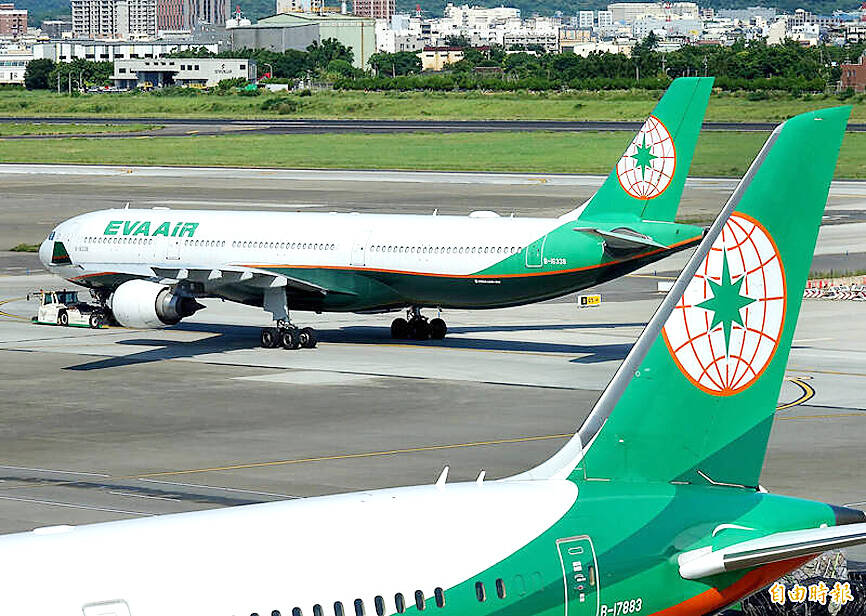EVA Airways Corp (長榮航空) has placed a firm order to purchase nine planes from Airbus SE, including six long-range A350-1000s and three single-aisle A321neo aircraft.
The order would bring EVA Airways’ backlog of aircraft to be delivered to 24 A350-1000s and 18 A321neo aircraft, Airbus said in a statement on Monday.
“The new additions to our fleet reaffirm our commitment to sustainable aviation and delivering an exceptional travel experience,” EVA Airways president Clay Sun (孫嘉明) said in the statement.

Photo: Taipei Times file photo
“Both the A350-1000 and A321neo set a high standard in their respective categories, offering remarkable efficiency and comfort to our passengers,” Sun said. “As we move forward with our fleet and network expansion plans, we look forward to leveraging the aircraft’s extended range and efficiency to strengthen our market position.”
The carrier’s board of directors on March 12 approved the plan to buy the nine Airbus aircraft for up to US$3.1 billion.
EVA Airways expects the delivery of the six A350-1000s to start in 2031 and the three A321neos in 2032.
The carrier, which operates a fleet of 85 planes, has eight Boeing Co 787-9s and five Boeing 787-10s on order, with delivery expected to be completed by 2029, while the delivery of 18 A350-1000s and 15 A321neos already on order would begin in 2027 and 2029 respectively.
EVA Airways posted a record net profit of NT$30.4 billion (US$921.02 million) for last year, up 31.6 percent from a year earlier, with earnings per share of NT$5.37, compared with NT$4.01 the previous year.
The number of passengers the carrier served hit 13.16 million last year, up 16.8 percent from a year earlier, with the average load factor — an industry metric for measuring the percentage of passenger capacity used — hitting 82.6 percent, company data showed.

SELL-OFF: Investors expect tariff-driven volatility as the local boarse reopens today, while analysts say government support and solid fundamentals would steady sentiment Local investors are bracing for a sharp market downturn today as the nation’s financial markets resume trading following a two-day closure for national holidays before the weekend, with sentiment rattled by US President Donald Trump’s sweeping tariff announcement. Trump’s unveiling of new “reciprocal tariffs” on Wednesday triggered a sell-off in global markets, with the FTSE Taiwan Index Futures — a benchmark for Taiwanese equities traded in Singapore — tumbling 9.2 percent over the past two sessions. Meanwhile, the American depositary receipts (ADRs) of Taiwan Semiconductor Manufacturing Co (TSMC, 台積電), the most heavily weighted stock on the TAIEX, plunged 13.8 percent in

A wave of stop-loss selling and panic selling hit Taiwan's stock market at its opening today, with the weighted index plunging 2,086 points — a drop of more than 9.7 percent — marking the largest intraday point and percentage loss on record. The index bottomed out at 19,212.02, while futures were locked limit-down, with more than 1,000 stocks hitting their daily drop limit. Three heavyweight stocks — Taiwan Semiconductor Manufacturing Co (TSMC, 台積電), Hon Hai Precision Industry Co (Foxconn, 鴻海精密) and MediaTek (聯發科) — hit their limit-down prices as soon as the market opened, falling to NT$848 (US$25.54), NT$138.5 and NT$1,295 respectively. TSMC's

TARIFFS: The global ‘panic atmosphere remains strong,’ and foreign investors have continued to sell their holdings since the start of the year, the Ministry of Finance said The government yesterday authorized the activation of its NT$500 billion (US$15.15 billion) National Stabilization Fund (NSF) to prop up the local stock market after two days of sharp falls in reaction to US President Donald Trump’s new import tariffs. The Ministry of Finance said in a statement after the market close that the steering committee of the fund had been given the go-ahead to intervene in the market to bolster Taiwanese shares in a time of crisis. The fund has been authorized to use its assets “to carry out market stabilization tasks as appropriate to maintain the stability of Taiwan’s

STEEP DECLINE: Yesterday’s drop was the third-steepest in its history, the steepest being Monday’s drop in the wake of the tariff announcement on Wednesday last week Taiwanese stocks continued their heavy sell-off yesterday, as concerns over US tariffs and unwinding of leveraged bets weighed on the market. The benchmark TAIEX plunged 1,068.19 points, or 5.79 percent, to 17,391.76, notching the biggest drop among Asian peers as it hit a 15-month low. The decline came even after the government on late Tuesday authorized the NT$500 billion (US$15.2 billion) National Stabilization Fund (國安基金) to step in to buoy the market amid investors’ worries over tariffs imposed by US President Donald Trump. Yesterday’s decline was the third-steepest in its history, trailing only the declines of 2,065.87 points on Monday and